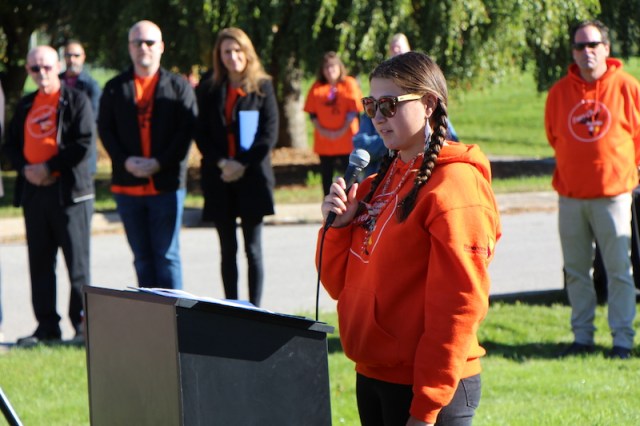
By Mike Anderson
A beautiful Fall day greeted a crowd of more than a hundred people who gathered to watch the flag of the Chippewas of Georgina Island First Nation (CGIFN) raised at the Georgina Civic Centre, marking the second annual National Day for Truth and Reconciliation on September 30.
The federal statutory holiday, established in 2021, honours Indigenous survivors and victims of Canada’s residential school system, which operated from 1831 to 1996.
It also coincides with Orange Shirt Day, an Indigenous-led grassroots commemorative day to raise awareness of the generational impact of residential schools.
Mayor Margaret Quirk was joined by York-Simcoe’s MP Scot Davidson and MPP Caroline Mulroney, Georgina Council, and several CGIFN members for the flag raising ceremony, which included smudging, tobacco offerings, and orange ribbons for people to take home.

Jared Big Canoe, a grandfather drummer from Georgina Island, started the event by singing the “Flag” and “Honour” songs.
“I’m going to sing the honour song for all the survivors of residential schools and any other negative thing that comes from colonization,” he said.
“But I just want to say as an Indigenous person here today that I have nothing but love in my heart, and I’m here to share, in a good way, so that we can create a better future for all our future generations.”

Big Canoe was followed by Mackenzie Frosch, 22, who explained the significance of Orange Shirt Day.
“The Orange Shirt was chosen to represent this day as it is a reference to a real orange shirt that was taken away from a residential school survivor, Phyllis Jack Webstad,” she said.
Webstad, a member of Stswecem’c Xgat’tem First Nation, was given an orange shirt by her grandmother to wear for her first day at St. Joseph’s Mission Residential School in Williams Lake, B.C. But, when she arrived, the shirt was taken from her.
“They stripped her and took away her clothes, including her new orange shirt. Phyllis’s orange shirt is a symbol of the loss of worth, culture, identity, community, and even life that Indigenous children faced,” she said.
In his remarks, MP Davidson emphasized the need for Canada to confront its past and acknowledge the wrongs done to Indigenous peoples.
“Residential schools and many other attempts to assimilate indigenous Canadians and divorce them from their culture marked a long and dark period in our country’s history that caused significant generational harm and fractured the relationship with Canada’s First Nations,” Davidson said.
“On this day, we take the opportunity for reflection as we celebrate and acknowledge the contribution of Canada’s First Nations. Contributions that date before this country was founded. And in the 152 years of our nation’s history, these contributions include nation building and the sacrifices of individuals from First Nations communities who have fought and died in the service of Canada, without official recognition of their Aboriginal identity.”
MPP Caroline Mulroney also acknowledged the importance of having a national day for reflection but added the work of reconciliation must go on year-round.
“The discovery of burial sites at residential schools was a reckoning for our nation. And we must acknowledge this stark and long chapter of our history today,” Mulroney said.
“We also must work towards reconciliation. This is ongoing work that we all must do in our families, our communities, our schools, and at all levels of government.”
Mayor Quirk said she was heartened to see more people attending the ceremony than last year and also stressed more work must be done to bring true reconciliation.
“The path of truth and reconciliation is a long one. We have a lot to do. We have a lot to learn,” she said.
“We didn’t learn the history of residential schools in our schools. And we should have. And that needs to be changed. And it’s days like today that get those conversations moving forward.”
“To have true reconciliation, you have to have the truth. And part of that truth is acknowledging the history of residential schools and what colonization did to the Indigenous communities across Canada.”

That sentiment was shared by many Georgina residents at the ceremony, including Alana Barker, who acknowledges that previous generations of her family, who came mainly from England, Ireland and Wales, held negative views towards Indigenous peoples and, like many Canadians, supported attempts to assimilate them.
“Racism was endemic and in the air when I was growing up,” she said.
“So I’m interested in healing that as part of the following generations. We’re here to heal, so I want to be part of that and to stand up.”
“Just coming here, I thought, well, I’m wearing an orange shirt, is that enough? But this has changed me. And I was changed by the smudging.”
Big Canoe was also happy to see that support is building for the holiday and what it represents.
“It’s the sum of a lifelong dream to have my people acknowledged,” he said.
“As a young kid, I’d walk through Canada and feel out of place. But now I feel we are being told to our faces that we belong here. And that feels great.”
“It’s also really important that Canadians, as a whole, take the time to educate themselves about what it all means and what’s been going on. That means the world to me.”

- Sweet Fundraiser for a Great Cause: Tarts4Hearts Festival - October 22, 2024
- Georgina’s public schools fare poorly on provincial math tests - October 22, 2024
- Chloe Daniels Brings Olympic Glory Home - October 21, 2024








































